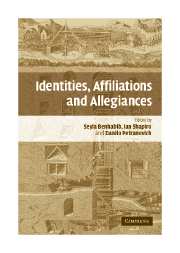Crossref Citations
This Book has been
cited by the following publications. This list is generated based on data provided by Crossref.
Somers, Margaret R.
and
Roberts, Christopher N.J.
2008.
Toward a New Sociology of Rights: A Genealogy of “Buried Bodies” of Citizenship and Human Rights.
Annual Review of Law and Social Science,
Vol. 4,
Issue. 1,
p.
385.
Ahadi, Daniel
2009.
Urban Mediascapes and Multicultural Flows: Assessing Vancouver’s Communication Infrastructure.
Canadian Journal of Communication,
Vol. 34,
Issue. 4,
p.
587.
Abulof, Uriel
2010.
Land, Blood and Ballots: The Curious Case of Resident Alien Franchise.
International Studies Review,
Vol. 12,
Issue. 2,
p.
320.
Chataway, Teresa
2010.
Cosmopolitical Citizenship.
Griffith Law Review,
Vol. 19,
Issue. 3,
p.
375.
Rangel‐Ortiz, Luis Xavier
2011.
The Emergence of a New Form of Mexican Nationalism in San Antonio, Texas.
Studies in Ethnicity and Nationalism,
Vol. 11,
Issue. 3,
p.
384.
Johnstone, Gerry
and
Quirk, Joel
2012.
Repairing Historical Wrongs.
Social & Legal Studies,
Vol. 21,
Issue. 2,
p.
155.
Keddie, Amanda
2012.
Refugee education and justice issues of representation, redistribution and recognition.
Cambridge Journal of Education,
Vol. 42,
Issue. 2,
p.
197.
BALA, SRUTI
2012.
Vectors of Participation in Contemporary Theatre and Performance.
Theatre Research International,
Vol. 37,
Issue. 3,
p.
236.
Cox, Pat
2012.
International Handbook of Migration, Minorities and Education.
p.
35.
May, Stephen
2015.
The problem with English(es) and linguistic (in)justice. Addressing the limits of liberal egalitarian accounts of language.
Critical Review of International Social and Political Philosophy,
Vol. 18,
Issue. 2,
p.
131.
Llanque, Marcus
2015.
Migration, Regionalization, Citizenship.
p.
101.
Strandbrink, Peter
2015.
Fair and cloudy weathers of tolerance in civic and religious education in northern Europe.
Education, Citizenship and Social Justice,
Vol. 10,
Issue. 1,
p.
3.
2015.
Everyday Peace?.
p.
191.
McNevin, Anne
2017.
Learning to live with irregular migration: towards a more ambitious debate on the politics of ‘the problem’.
Citizenship Studies,
Vol. 21,
Issue. 3,
p.
255.
Knott, Eleanor
2017.
The extra-territorial paradox of voting: the duty to vote in extra-territorial elections.
Democratization,
Vol. 24,
Issue. 2,
p.
325.
Poe, Andrew
2018.
Expressions of a Fascist Imaginary.
South Atlantic Quarterly,
Vol. 117,
Issue. 4,
p.
815.
Rosenman, Ellen
2018.
BEYOND THE NATION: PENNY FICTION, THE CRIMEAN WAR, AND POLITICAL BELONGING.
Victorian Literature and Culture,
Vol. 46,
Issue. 1,
p.
95.
Arjona, Ana
2019.
Inside Countries.
p.
214.
Nabers, Dirk
2019.
War and ethical change.
Critical Studies on Security,
Vol. 7,
Issue. 3,
p.
219.
Knott, Eleanor
2019.
Strategy, identity or legitimacy? Analysing engagement with dual citizenship from the bottom-up.
Journal of Ethnic and Migration Studies,
Vol. 45,
Issue. 6,
p.
994.



